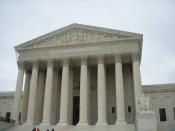For some murderers, the only justice is death. For instance, take the case of "Bonzai Bob" Vickers. He is on death row for the murder of his jailhouse cellmate, Frank Ponciano. "Feeling wronged because Ponciano had taken his Kool-Aid...Vickers stabbed his victim to death then carved "Bonsai" into Ponciano's back. Vickers's only regret is that he didn't get to carve a swastika beside the misspelled Japanese war cry" (Leibowitz 142). Four years later, "After a fellow killer, Holsinger...made a suggestive remark about Vickers's niece, Vickers fashioned a firebomb out of hair gel. He burned Holsinger to death, and then tossed in a second firebomb for good measure. 'Did I do a good job?' Vickers asked investigators later" (Leibowitz 142). It's for Vickers and people like Timothy McVeigh that we need the death penalty. There are those who refuse to stop killing and those whose murders are so great, leveling Hitler-type status that the death penalty cannot be abolished.
What about those who are not so aware of their crime's magnitude? People like the mentally disabled and juveniles. What about the victims, sometimes truly innocent, of either bad representation or politics? Do they deserve to be considered in the same boat as Vickers, McVeigh and Hitler? Even though the death penalty is still necessary, further federal laws are needed to safeguard those who are not the most vicious criminals deserving the death penalty, but rather victims of a system unable to fairly administer justice. If anyone is to be killed, society needs to be absolutely sure that they are first worthy of killing.
Somewhere the line must be drawn. This year the U.S. Supreme Court will hear arguments on whether or not the federal law should continue to allow the executions of persons under the age of 18 convicted of murder.



You've done it again......
Yet another brilliant essay from srmikeone. I hope to be seeing many more submissions from you - you really have such a talent with words.
4 out of 4 people found this comment useful.